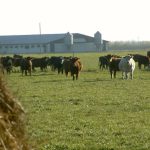Hormone implants and feed additives such as ionophores (e.g. monensin/Rumensin), beta-agonists (e.g. ractopamine/Optaflexx) and MGA (to suppress heat in heifers) have allowed Canada’s feedlot sector to dramatically improve growth rates, feed efficiency and environmental performance. In-feed antimicrobials to prevent liver abscesses (e.g. tylosin) also have an indirect benefit because healthy cattle grow better. While consumers […] Read more














